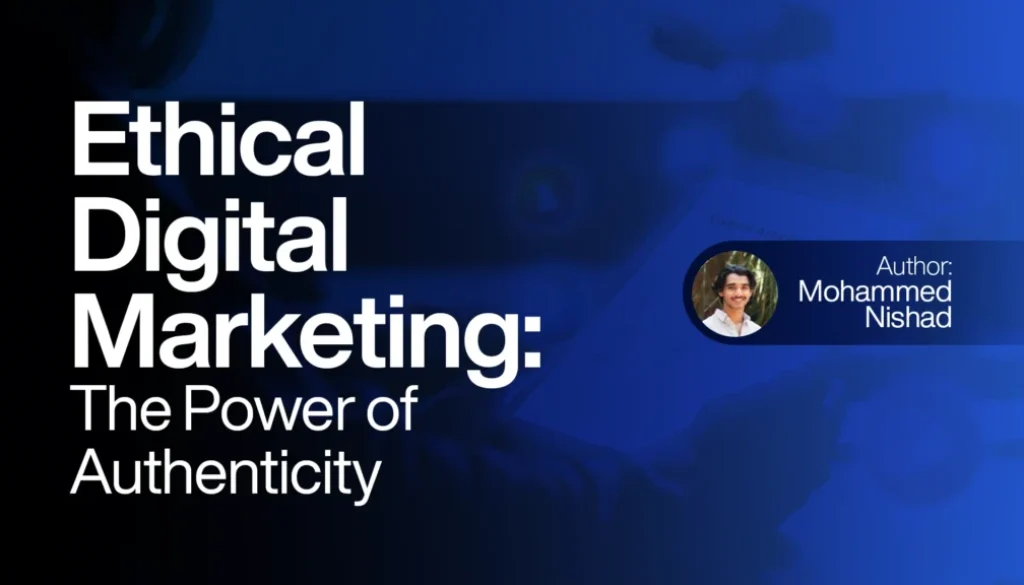Ethical Digital Marketing: The Power of Authenticity
In today’s digital world, consumers are constantly exposed to marketing messages. But the old tactics of manipulation and exaggeration no longer work. People want brands that are honest, transparent, and ethical. If your marketing is purely sales-driven without building real connections, you risk losing trust—and trust is everything in the long run.
Table of Contents
What is Ethical Digital Marketing?
Ethical digital marketing means promoting products and services with integrity. It’s about being transparent, respecting privacy, practicing social responsibility, and competing fairly. Brands that embrace these values create marketing campaigns that benefit both consumers and society, ultimately strengthening their reputation and credibility.
Why Ethical Marketing Matters More Than Ever
Consumers today are more skeptical than ever before. They want brands they can believe in. Ethical marketing builds trust, enhances brand reputation, ensures compliance with regulations, and fosters long-term customer loyalty. Companies that put ethics first aren’t just doing the right thing—they’re setting themselves up for lasting success.
Authenticity: The Key to Consumer Trust
Authenticity is what turns customers into loyal advocates. When brands are honest about their products, uphold strong business ethics, and provide genuine customer service, they create deeper connections with their audience. People appreciate brands that stay true to their values and deliver on their promises.
The Challenges of Staying Authentic
Short-Term Sales Pressure
Many businesses focus too much on immediate profits, sacrificing authenticity in the process. But long-term success comes from building relationships, setting realistic goals, and investing in brand trust.
Navigating Social Media Trends
Social media is a powerful tool, but it can tempt brands to chase trends at the expense of their identity. Instead, brands should create content that aligns with their values and engage with audiences authentically—without clickbait or misleading messages.
Balancing Personalization and Privacy
People love personalized experiences but also care about their privacy. Ethical marketers must be mindful of how they collect and use data, ensuring transparency and compliance with privacy laws like GDPR and CCPA.
Strategies for Ethical Digital Marketing
Transparent Communication
User-Generated Content
Encourage real customer reviews and testimonials. People trust other consumers more than brands, making authentic user experiences a powerful credibility booster.
Consistent Brand Messaging
Keep your tone, visuals, and messaging consistent across platforms. A unified brand voice makes your business feel reliable and familiar.
Listening to Customer Feedback
Respond to both positive and negative feedback. A brand that acknowledges its mistakes and adapts shows authenticity and a commitment to improvement.
Aligning Marketing with Core Values
Ensure your marketing reflects your brand’s principles. Supporting ethical business practices and social causes helps strengthen credibility and consumer trust.
Ethical Use of Data in Marketing
Respecting consumer privacy is crucial. Brands must be transparent about data collection, use secure systems, and give customers control over their preferences. Ethical data usage allows businesses to personalize experiences without compromising trust.
The Future of Ethical Digital Marketing
AI and Automation with Integrity
Automation and AI can improve marketing efforts—whether through chatbots offering 24/7 support or personalized content recommendations—but should always be used responsibly to avoid invading consumer privacy.
Consumers Expect More Accountability
People want brands to be open about where their products come from, how they operate, and what they stand for. Companies that prioritize sustainability and ethical business practices will attract and keep loyal customers.
Evolving Regulations and Standards
As digital ethics continue to evolve, businesses must stay ahead of compliance requirements. Proactively adopting ethical marketing practices will ensure they remain trustworthy and credible.
Final Thoughts
Ethical digital marketing isn’t just a trend—it’s the future. Brands that prioritize transparency, authenticity, and integrity will not only build trust but also secure long-term success. By committing to ethical marketing, businesses contribute to a more responsible digital landscape while standing out in a crowded market. The time to embrace ethical marketing is now.



